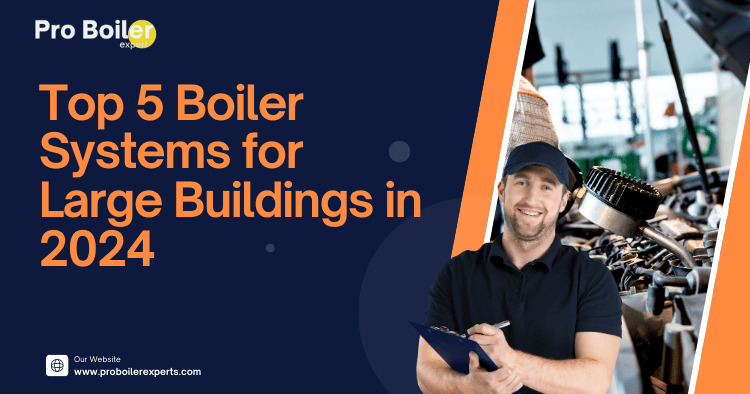Table of Contents
- Introduction
- 1. Fire-Tube Boilers
- 2. Water-Tube Boilers
- 3. Condensing Boilers
- 4. Modular Boilers
- 5. Biomass Boilers
- Conclusion
- FAQs
Introduction
When it comes to heating large buildings, choosing the right boiler system is crucial for efficiency, cost-effectiveness, and environmental impact. As we step into 2024, advancements in technology and a growing emphasis on sustainability have made it essential to stay updated on the best options available. This article dives into the top five boiler systems suitable for large buildings, helping you make informed decisions for your heating needs.
1. Fire-Tube Boilers
Fire-tube boilers are one of the most traditional types of boilers, widely used in large buildings due to their reliability and efficiency. These boilers operate by passing hot gases from a combustion source through tubes submerged in water. As the gases pass through the tubes, they transfer heat to the water, creating steam or hot water for heating purposes.
Advantages
- Efficiency: Fire-tube boilers typically operate at high efficiency, making them cost-effective for large heating demands.
- Space-Saving: They have a compact design, which is advantageous for buildings with limited space.
- Ease of Maintenance: Their design allows for easy access to internal components, simplifying maintenance tasks.
When to Use
Fire-tube boilers are ideal for facilities that require a consistent supply of hot water or steam, such as hospitals, schools, and manufacturing plants. For additional insights on choosing the right type of boiler for your home, consider reading about the top benefits of conventional boilers.
Fire-tube boilers have a long-standing reputation for reliability and are a trusted choice in many industries.
Visual Element
| Feature | Fire-Tube Boiler |
|---|---|
| Efficiency | High |
| Maintenance | Easy |
| Space Requirement | Compact |
| Typical Applications | Hospitals, Schools |
2. Water-Tube Boilers
Water-tube boilers work on a different principle than fire-tube boilers. In these systems, water circulates through tubes heated by combustion gases. This design allows for higher pressure and temperature outputs, making water-tube boilers suitable for large-scale applications.
Advantages
- Higher Efficiency: Water-tube boilers can achieve higher steam pressures and temperatures, resulting in better efficiency.
- Quick Response: They can quickly adapt to load changes, providing immediate heating.
- Durability: The construction of water-tube boilers generally allows for longer operational life.
When to Use
These boilers are often used in power plants, large industrial facilities, and in applications requiring high steam output. For further comparisons, check out the comparison of gas vs. oil boilers.
Water-tube boilers are especially beneficial in settings where high efficiency and rapid heating response are critical.
Visual Element
| Feature | Water-Tube Boiler |
|---|---|
| Efficiency | Very High |
| Maintenance | Moderate |
| Space Requirement | Larger than Fire-Tube |
| Typical Applications | Power Plants, Industry |
3. Condensing Boilers
Condensing boilers are designed to maximize efficiency by capturing and reusing heat that would typically be lost in the exhaust. This innovative design allows them to achieve efficiencies of over 90%, making them a popular choice for environmentally-conscious building managers.
Advantages
- High Efficiency: Utilizing heat from exhaust gases leads to significant energy savings.
- Reduced Emissions: Lower fuel consumption translates to a decrease in greenhouse gas emissions.
- Cost-Effective: Although the upfront investment may be higher, long-term savings on fuel costs can be substantial.
When to Use
Condensing boilers are ideal for new construction projects or retrofitting existing systems in commercial buildings, hotels, and large residential complexes. For insights into condensing boiler efficiency, check out the benefits of condensing boilers.
By reclaiming heat that would be wasted, condensing boilers are paving the way to a more sustainable future.
Visual Element
| Feature | Condensing Boiler |
|---|---|
| Efficiency | Over 90% |
| Maintenance | Moderate |
| Space Requirement | Compact |
| Typical Applications | Commercial, Residential |
4. Modular Boilers
Modular boilers consist of multiple smaller units that can be combined to provide a scalable heating solution. This design offers flexibility and redundancy, making it easier to manage varying heating demands.
Advantages
- Scalability: Easy to add or remove units based on heating needs.
- Redundancy: If one unit fails, others can maintain heating, enhancing reliability.
- Energy Efficiency: They can operate more efficiently at lower capacities.
When to Use
Modular boilers are perfect for large buildings with fluctuating heating demands, such as office complexes, shopping malls, and educational institutions. For more information on energy efficiency, check out the energy efficiency tips for boiler installation.
The modular approach provides not only flexibility but also peace of mind with built-in redundancy.
Visual Element
| Feature | Modular Boiler |
|---|---|
| Efficiency | High |
| Maintenance | Easy |
| Space Requirement | Variable |
| Typical Applications | Offices, Malls |
5. Biomass Boilers
Biomass boilers use organic materials such as wood pellets, agricultural residues, or other biofuels to generate heat. As a renewable energy source, biomass boilers contribute to sustainability goals for large buildings.
Advantages
- Sustainability: Utilizing renewable resources reduces dependency on fossil fuels.
- Cost Savings: Biomass fuels can be cheaper than traditional fuels, leading to lower operating costs.
- Carbon Neutrality: Burning biomass can be considered carbon-neutral, as the CO2 released is offset by the CO2 absorbed by plants during their growth.
When to Use
Biomass boilers are best suited for educational facilities, community centers, and large residential projects focused on sustainability. For more on eco-friendly options, explore the benefits of biomass boilers for eco-friendly heating.
Biomass boilers represent a forward-thinking choice, marrying technology with ecological responsibility.
Visual Element
| Feature | Biomass Boiler |
|---|---|
| Efficiency | Moderate to High |
| Maintenance | Moderate |
| Space Requirement | Larger |
| Typical Applications | Schools, Community Centers |
Conclusion
Selecting the right boiler system for large buildings is not just about heating; it’s about efficiency, sustainability, and future needs. Each of the systems discussed—fire-tube, water-tube, condensing, modular, and biomass—offers unique advantages that cater to different building requirements. As we embrace 2024, staying informed about these options will help you make the best choice for your heating system.
FAQs
Q: What factors should I consider when choosing a boiler system?
A: Consider factors such as the size of your building, the heating demand, energy efficiency, maintenance requirements, and environmental impact.
Q: Are condensing boilers worth the investment?
A: Yes! While they may have a higher upfront cost, their energy savings and reduced emissions often make them a cost-effective choice in the long run. For more on condensing efficiency, see the benefits of condensing boilers.
Q: How do I maintain my boiler system?
A: Regular maintenance includes checking for leaks, inspecting safety valves, and cleaning components. It’s advisable to schedule professional inspections annually.
Q: Can I switch to a biomass boiler?
A: Yes, transitioning to a biomass boiler can be a great way to improve sustainability. However, assess your local fuel availability and infrastructure before making the switch.
This comprehensive guide aims to inform building managers and owners about the most effective boiler systems for large buildings in 2024, emphasizing efficiency and sustainability.





